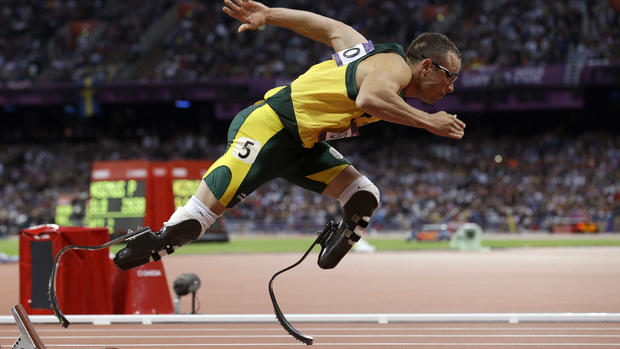Paralympics: Double-amputee Oscar Pistorius has tough competition in 100-meter race
(CBS/AP) LONDON - After his trailblazing Olympic debut, double-amputee Oscar Pistorius is downplaying his chances of dominating at the Paralympics.
The "Blade Runner" said Tuesday that he could struggle to defend his Paralympic title in the 100 meters, opting instead to focus on winning the 200 and 400 again.
"I'd love to defend my (100) title ... I just think I have really moved away from the 100," Pistorius said from Olympic Park, a day before he will carry the South African flag at the opening ceremony. "I ran my first race in the 100 meters last weekend in 16 months, and I ran in 11.1 into quite a strong headwind.
"So I feel like I am in quite strong shape to be a feature in that race, but some of the top guys are still running quicker than I am and that's their focus. They will be resting for the 100."
World champion Jerome Singleton and world record holder Jonnie Peacock are Pistorius' greatest threats in the short sprint next Thursday.
U.S. Paralympian Jerome Singleton aims to "put on a show" in London
Face to Face: World's fastest amputee wants to set positive example
"I have to be realistic and say the 200 and 400 are the events I am probably better suited at," the 25-year-old Pistorius said.
Singleton, who will be competing in the 100 and 200, thinks Pistorius "is saying that as an excuse."
(CBS News correspondent Bill Plante interviewed Singleton in June. See full interview at left).
"If you are in Olympic shape and you can compete against the able bodied ... you have to run a quick 100," the 26-year-old American said in an interview from a promotional event. "You are going to see one of the best races to ever come through at the Paralympics ... we have a new group of people trying to take on the old guard."
Pistorius has a rival closer to home, his athletes' village roommate Arnu Fourie.
"It's going to be a bit awkward the night before the final- I might have to drop some sleeping pills in his water or something," Pistorius said, joking.
Pistorius made his Olympic debut in the 400 this month at the London Games, reaching the individual semifinals and competing in the relay final.
"Being able to run out here against some of the world's best really pushed me to want to run harder and better, and inspired me in many ways," Pistorius said. "I think what was really nice is I got used to the track and the kind of intensity ... I'd never want to say that one (the Olympics or Paralympics) is more important than the other because I'd never be able to choose. I hope my performances reflect where I'm at physically."
But unlike Olympic sprint star Usain Bolt, Pistorius will let others decide if he's a "legend."
"I'd never say that about myself," he said.
The South African believes Britain's status as Paralympics host is recognition for being at the forefront of banishing stigmas in disability sport.
A Paralympic event in London's Trafalgar Square reinforced that view last year.
"Kids didn't stare at people's prosthetic legs and they were asking guys in wheelchairs what events they do," Pistorius said. "There are a lot of people here who don't focus on the disability anymore — they focus on the athletes' abilities ... there's nothing to be ashamed of."
